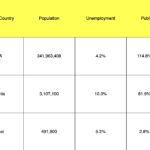- United States
- Albania
- Brunei
United States
The United States of America was recognized as an official nation after the Treaty of Paris in 1783, and the thirteen British American colonies united. It has since grown to consist of 50 states that span across North America, endure hardships including war and economic depression. The US is considered to be the fourth largest country in the world.
Albania
Albania, a country in Southeastern Europe, declared its independence in 1912 before entering a state of political upheaval and operating briefly as a monarchy. The country has been occupied by Italy, Germany, and communist partisans between 1939 and 1944, before establishing itself as a multi-party democracy in the 1990s. Albania experienced further economic turmoil in the late 90s before UN peacekeepers intervened, and joined NATO in 2009.
Brunei
Brunei is a small country in Southeastern Asia that had power over the Philippines and Borneo between the 15th and 17th centuries, but faced struggles afterwards of piracy, expansion, and royal succession. It gained independence in 1984, and the same family has ruled the country for more than six centuries. Brunei has one of the highest GDPs (Gross Domestic Product) per capita in the world due to its natural gas fields and other resources.
- Data Table
My goal with the data that I collected from these three countries was to draw a conclusion between population and unemployment, and to see how each country’s debt was affected. I found that the lower a country’s population, the lower its public debt is, and this pattern can be seen clearly in the countries I chose, with Brunei having the lowest population and debt, and the US having the highest. In terms of unemployment, the United States actually breaks the pattern that I had originally anticipated. Albania and Brunei show that population may be associated with unemployment rates, but the US actually has the lowest of the three while having the highest population by far. It might be expected that when a country is highly populated, there would be fewer opportunities for employment, but the United States is an exception to this expectation which sets it apart from many other countries in the world.



